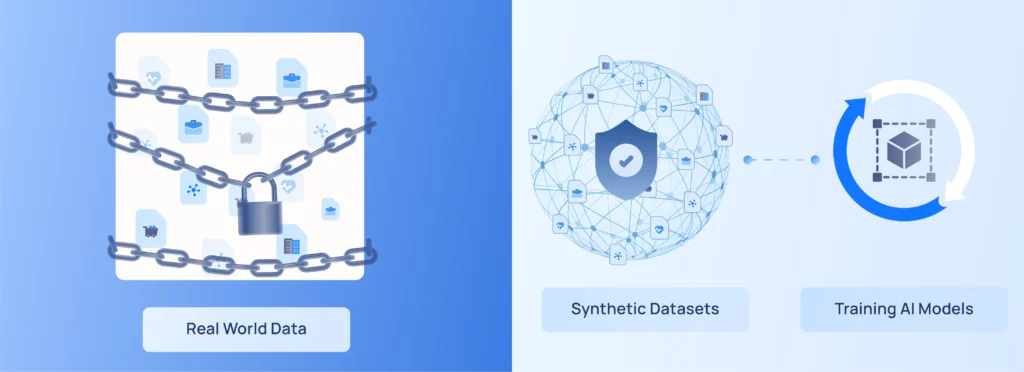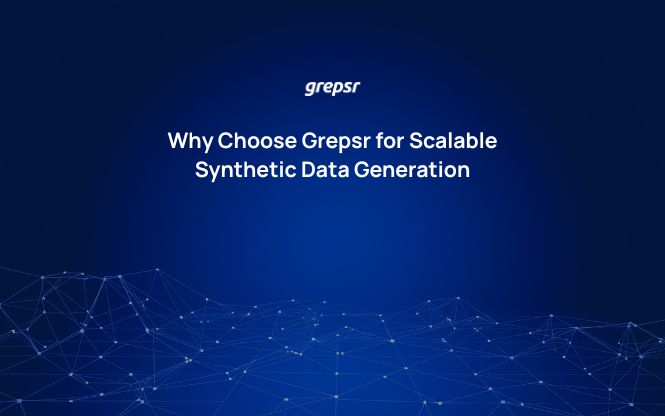
While tech companies spend billions developing AI models, a shocking number still struggle with the basic ingredient that determines success or failure: high-quality training data. The demand for high-quality, diverse data is more pressing than ever. However, accessing large datasets, especially those that protect individual privacy, presents significant challenges. This is where synthetic data comes into play.
In this article, we’ll explore how synthetic data for AI training is revolutionizing the way we build and train AI models, enabling businesses to create more accurate, robust, and privacy-compliant systems.

The Role of Synthetic Data in AI Model Training
Synthetic data for AI training plays a crucial role in training AI models by providing large volumes of diverse, high-quality data. AI models thrive on data, and the more varied the data, the better the model’s generalization and performance. However, obtaining real-world data can be expensive, time-consuming, and fraught with privacy risks. Generative AI for synthetic data overcomes these barriers by generating artificial datasets that are statistically similar to real-world data but do not contain any sensitive or personal information.
These datasets allow AI systems to be trained on a much larger scale, improving model accuracy, robustness, and performance across a range of applications, from image recognition to predictive analytics. By using synthetic data generation, businesses can accelerate model development while avoiding the need to collect vast amounts of real-world data.

How Synthetic Data Maintains Privacy While Offering Realistic Insights
One of the most significant advantages of synthetic data for AI is its ability to maintain privacy. In industries like healthcare, finance, and e-commerce, where data privacy is a critical concern, generative AI for synthetic data generation enables companies to generate realistic datasets without compromising the security of sensitive information. Because synthetic data is artificially generated, it does not contain any personal, confidential, or identifiable information, making it compliant with data protection regulations like GDPR and CCPA.
For example, in healthcare, synthetic data for AI models can be used to simulate patient records, allowing AI models to be trained on a variety of medical conditions and treatments without violating privacy laws. This ensures that AI models can learn from data without exposing sensitive individual information.
Use Cases in Various Fields
E-commerce
In the e-commerce industry, synthetic data for Gen AI can simulate customer purchase behavior, preferences, and browsing patterns. This data can be used to train recommendation engines, optimize pricing strategies, and improve product matching algorithms, all while maintaining customer privacy. By generating realistic consumer profiles, companies can better understand market trends without ever using actual customer data. Data providers such as Grepsr offer solutions to automate the generation and enrichment of such datasets for AI models.
Real Estate
Synthetic data generation for AI can also transform the real estate industry. By generating realistic property listings, pricing data, and market trends, AI models can predict property values, evaluate investment opportunities, and offer personalized property recommendations. This enables real estate companies to deploy AI-driven solutions without exposing private transaction data or customer information.
Jobs and Recruitment
In the jobs and recruitment sector, synthetic data for AI training can simulate candidate profiles, resumes, and job application patterns. This allows AI algorithms to assess candidate qualifications, predict job-fit, and optimize recruitment processes while protecting the privacy of job applicants. Synthetic data also helps companies train models to understand hiring trends, diversity patterns, and workforce demands without the risk of discrimination or bias inherent in real-world data.
Benefits Over Using Raw, Real-World Data
Fewer Privacy Concerns
Synthetic data generation for AI ensures that personal and sensitive information is never exposed, minimizing the risk of privacy violations or breaches. Unlike real-world data, which may contain identifiable information, synthetic data is generated in a way that prevents the association of data points with real individuals, ensuring compliance with privacy regulations.
Larger Datasets
In many cases, collecting enough high-quality real-world data is expensive and difficult. With generative AI for synthetic data, companies can generate vast amounts of data at a fraction of the cost. This helps AI systems learn from a more diverse dataset, improving the robustness and performance of AI models.
Cost-Effective Data Generation
Raw data collection often involves significant resources, especially for specialized fields such as healthcare or autonomous vehicles. Synthetic data for AI can be generated quickly and cost-effectively, enabling companies to access the data they need without expensive data collection or data-buying initiatives.
With Grepsr’s data extraction pipelines, businesses can generate large-scale synthetic datasets quickly, reducing reliance on expensive and privacy-sensitive real-world data.
No Need for Anonymization
With real-world data, companies often need to anonymize or de-identify the data to protect user privacy. Synthetic data for AI models eliminates this step entirely, as the data generated is already free from personal or sensitive information.
The Balance Between Synthetic and Real Data for Optimal AI Performance
While synthetic data for AI offers numerous advantages, it is important to strike the right balance between synthetic and real-world data. It alone may not capture the full complexity of real-world environments. By combining synthetic data with real-world data, companies can ensure that their AI models are both scalable and accurately reflective of real-world conditions.
For instance, synthetic data is useful for initial training and model validation. Whereas real-world data for fine-tuning and ensuring that the model can handle edge cases and unexpected scenarios. This combination of synthetic and real data results in a model that is both robust and adaptable to real-world challenges.
How Companies Can Adopt Synthetic Data for Safer, Faster Model Deployment
Start with a Pilot Project
Companies can begin by identifying a specific problem that they can address with synthetic data for AI training. By starting small, businesses can test the effectiveness of synthetic data and refine their approach before scaling to larger applications. A successful pilot project can demonstrate the value of synthetic data generation in reducing privacy concerns while improving AI model performance.
Partner with Data Providers
For businesses without in-house expertise in synthetic data generation, partnering with data providers that specialize in this technology can help jumpstart their journey. Many providers offer tools and platforms to generate synthetic datasets tailored to specific industries and use cases.
Companies looking to adopt synthetic data for safer and faster model deployment can partner with specialized providers such as Grepsr. We offer end-to-end solutions for synthetic data generation at scale.
Integrate Synthetic Data into the AI Workflow
Adopting synthetic data should not be a one-off initiative. For long-term success, businesses need to integrate synthetic data generation into their AI development pipelines. This includes automating the generation of synthetic datasets. It also involves incorporating them into the data preprocessing stages to continuously improve the artificial intelligence model’s performance.
Monitor and Validate AI Models
Once you deploy the AI model, continuous monitoring is crucial to ensure that it is performing as expected. Regular validation against real-world data ensures that the AI model remains effective and relevant over time. Meanwhile, synthetic data is necessary to simulate edge cases or hard-to-obtain data.
Conclusion
Synthetic data is a transformative tool that enables businesses to train smarter, faster, and more private AI models. By leveraging generative AI for synthetic data generation, companies can ensure privacy, scalability, and cost efficiency in their projects. As the adoption of synthetic data models continues to grow, organizations that embrace this technology will be able to better navigate the challenges of data privacy. They will also be able to deliver high-quality AI solutions more effectively.
Ready to train AI models with data that’s safe, scalable, and high-quality? Let us prove how synthetic data from Grepsr can transform your AI projects.







